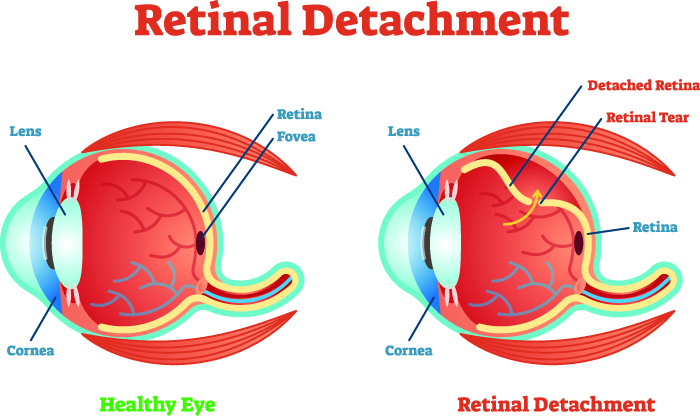Retinal Detachment Treatment & Diagnostics in Tardeo, Mumbai
Retinal Detachment
The retina is the innermost thin lining of tissue present in the eye containing millions of light-sensitive cells. The retina is one of the most critical parts of the eye. It translates the two-dimensional image of the visual world created by optics into electrical neural impulses, which helps the brain create visual perception.

What Is Retinal Detachment?
Retinal detachment is a medical condition where the retina separates from its actual position. The retinal cells, which are responsible for providing oxygen to the eye, get detached.
In the early stages, only some part of the retina gets detached, but if the retinal detachment is not treated promptly, it could lead to permanent loss of vision.
What Are the Symptoms of Retinal Detachment?
There are no severe symptoms of retinal detachment. In most cases, retinal detachment is painless but comes with warning signs. Some of the symptoms are:
- The sudden appearance of floaters, dots, threads, and dark spots across your vision.
- Reduced side vision
- Curtain like shadow or darkness over the visual field
- Flashes of light in one or both eyes
- Blurred vision
- Heaviness in eye
- Poor vision in dim light
- Straight lines appear curved
What Are the Types and Causes of Retinal Detachment?
The retina could also be torn before it detaches. In that case, the fluid present inside the eye could leak and separate the retina from the underlying tissues.
There are mainly three types of retinal detachment:
- Rhegmatogenous: This is the most common cause of Retinal detachment. Having a rhegmatogenous retinal detachment means having a tear or hole in the retina. Some causes of rhegmatogenous retinal detachment are:
- Aging
- Eye injury
- Eye surgery
- Near-sightedness
- Tractional: In fractional retinal detachment, the scar tissue present on the retina surface contracts, which eventually causes it to pull away. People with diabetes are more susceptible to this type due to damaged blood vessels present in the eye.
- Exudative: Exudative retinal detachment occurs when fluids build up behind the retina. This fluid pushes the retina behind, causing it to detach. Some causes of exudative retinal detachment are:
- Leaking of blood vessels
- Swelling in the back of the eye
- Injury in eye
- Age-related macular degeneration
- Tumour in the eyes
When to See a Doctor?
Seek immediate medical attention if you are facing any of the symptoms mentioned above. Retinal detachment is a medical emergency in which complete vision loss is a possibility.
Over-the-counter medications may provide relief for a while, but the conditions may worsen if not treated properly. Consult your doctor and disclose your medical history to start treatment as soon as possible. For further consultation or information, get in touch with one of the best surgeons in Tardeo, Mumbai, at Apollo Hospitals.
Request an appointment at Apollo Hospitals, Tardeo, Mumbai.
Call 1860 500 2244 to book an appointment.
What Is the Treatment for Retinal Detachment?
Laser treatment or surgery is performed to treat retinal detachment. Photocoagulation or cryotherapy may be performed to treat retinal holes or tears.
An ophthalmologist may perform the following three types of surgery for retinal detachment:
- Vitrectomy: Today, it is the most common surgery performed for retinal detachment. It involves the removal of the vitreous gel of the eye.
- Scleral buckling: It involves sewing a piece of plastic into the wall of the eye.
- Pneumatic retinopexy: In this type of surgery, your ophthalmologist will inject a gas bubble into the eye. You will have to hold your head in such a way so that the bubble floats over the detached area and pushes it against the back of your eye.
Conclusion
Thanks to advancements in technology, retinal detachment can now be successfully treated. It may take 3 to 6 weeks for recovery after the surgery. Identification of symptoms and knowledge of risk factors for retinal detachment may aid in prompt referrals and vision retention.
Ask your ophthalmologist or doctor for any doubts before undergoing surgery.
Some of the risks associated with retinal detachment surgery are:
- Fogging in the lenses of the eye
- Bleeding
- Infection
- Cataract formation
- Vision loss
People aged 50 or more are more susceptible to retinal detachments. Some other factors are:
- Previous eye injury or surgery
- Hereditary
- Myopia
- Vision will be distorted for days to a week after surgery
- Swelling of eyes is common after surgery
Our Doctors
DR. NEETA SHARMA
MBBS, DO (Ophthal), ...
| Experience | : | 31 Yeras Experience |
|---|---|---|
| Speciality | : | Ophthalmology... | Location | : | Chembur |
| Timings | : | Thur, Fri : 10:00 AM... |
DR. PALLAVI BIPTE
MBBS, MS (Ophthalmol...
| Experience | : | 21 Yeras Experience |
|---|---|---|
| Speciality | : | Ophthalmology... | Location | : | Chembur |
| Timings | : | Mon - Wed, Fri & Sat... |
DR. NUSRAT BUKHARI
MBBS, DOMS, Fellowsh...
| Experience | : | 12 Yeras Experience |
|---|---|---|
| Speciality | : | Ophthalmology... | Location | : | Tardeo |
| Timings | : | Mon - Fri : 9:00 AM ... |
Our Top Specialities
NOTICE BOARD
CONTACT US
CONTACT US
 Book Appointment
Book Appointment





.svg)
.svg)
.svg)
.svg)








